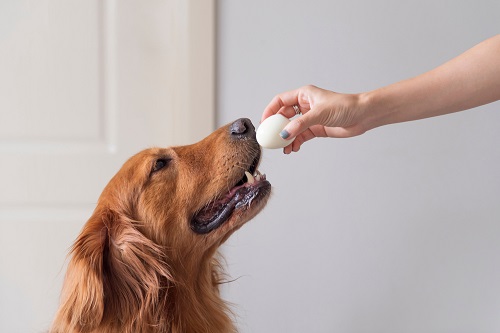Can Dogs Eat Eggs? Can they be a good daily meal for your pooch? Let’s have a look in detail with all the information!
Can Dogs Eat Eggs? If you’re a dog owner, you’ve likely wondered if it’s safe to share your breakfast with your furry friend. The good news is that eggs are not only safe for dogs, but they can also provide numerous health benefits! Keep on reading!
What is an Egg?

An egg consists of a yolk, surrounded by egg white, enclosed within a protective shell. The yolk and egg white contain various nutrients, including protein, vitamins, and minerals, that nourish the developing embryo inside the egg.
Check out Is Miso Soup Safe for Dogs? here
Can Dogs Eat Eggs?
So, Can Dogs Eat Eggs? Well, they can be a healthy addition to their diet. Cooked eggs are generally safe for dogs to eat, but it’s important to feed them in moderation and avoid giving them raw eggs, as raw eggs can contain harmful bacteria like salmonella, making dogs sick.
Are Eggs Good for Dogs?
Yes, eggs can be a healthy addition to a dog’s diet, as they are an excellent source of protein, vitamins, and minerals. The protein in eggs can help to build and maintain strong muscles.
At the same time, vitamins like vitamin A, D, and E, and minerals like iron and selenium, can support overall health and well-being.
Check out Are Egg Rolls Bad For Dogs? here
Health Benefits of Eggs for Dogs

Eggs can provide several health benefits for dogs when fed in moderation as part of a balanced diet. Here are some of the potential health benefits of eggs for dogs:
- Protein: Eggs are an excellent source of high-quality protein, which is essential for building and maintaining strong muscles in dogs.
- Vitamins: Eggs contain several important vitamins for a dog’s overall health, including vitamin A, vitamin D, and vitamin E. These vitamins can support healthy skin and coat, immune function, and vision.
- Minerals: Eggs are also a good source of minerals like iron and selenium, which are important for maintaining healthy bones and teeth, as well as supporting cognitive function and metabolism.
- Omega-3 Fatty Acids: The fatty acids found in eggs, particularly omega-3s, can help to promote a healthy coat and skin in dogs.
- Digestion: Eggs can be easily digested by dogs and may be a good source of nutrition for dogs with digestive issues.
However, it’s important to keep in mind that while eggs can be a healthy addition to a dog’s diet, they should not be the sole source of nutrition, and it’s always best to consult with a veterinarian to ensure that eggs are suitable for your dog’s specific dietary needs.
Can Dogs Eat Eggs? A Few Health Concerns
While eggs can be a healthy addition to a dog’s diet, there are also some concerns to remember. Here are a few potential concerns about feeding eggs to dogs:
- Risk of Salmonella: Raw eggs can carry harmful bacteria like salmonella, making dogs sick. It’s important to always cook eggs thoroughly before feeding them to your dog.
- Allergies: Some dogs may be allergic to eggs, which can cause symptoms like itching, hives, and gastrointestinal upset. If your dog has not eaten eggs before, it’s a good idea to introduce them gradually and monitor for any signs of an allergic reaction.
- Fat Content: Eggs are a high-fat food, and feeding too many eggs to your dog can lead to weight gain and other health issues. It’s important to feed eggs in moderation and as part of a balanced diet.
- Added Ingredients: Adding ingredients like salt, butter, or oil to eggs can harm dogs in large quantities. It’s best to feed eggs plain and without any added ingredients.
- Cholesterol: While dogs don’t typically have the same cholesterol concerns as humans, feeding too many eggs to your dog can potentially lead to high cholesterol levels over time.
Check out Are Deviled Eggs Bad for Dogs? here
How To Feed Your Dog Eggs
If you want to include eggs in your dog’s diet, here are some tips on how to feed them:
- Cook Eggs Thoroughly: It’s important to cook eggs thoroughly before feeding them to your dog to ensure any harmful bacteria are killed. You can scramble, boil, or even bake eggs for your dog.
- Avoid Adding Ingredients: Avoid adding ingredients like salt, butter, or oil to eggs when feeding them to your dog. These can be harmful to dogs in large quantities.
- Feed Eggs in Moderation: Eggs are a high-fat food, and feeding too many eggs to your dog can lead to weight gain and other health issues. It’s important to feed eggs in moderation and as part of a balanced diet.
- Introduce Gradually: If your dog has never eaten eggs before, it’s a good idea to introduce them gradually. Start with a small amount of egg and monitor your dog for any signs of discomfort or allergic reactions.
- Consider Mixing with Other Foods: You can mix eggs with your dog’s regular food or other healthy ingredients like cooked vegetables or lean meat to create a balanced meal.
- Avoid Raw Eggs: It’s not recommended to feed your dog raw eggs, as they can carry harmful bacteria like salmonella.
How Much Egg Can a Dog Eat?

The amount of egg a dog can eat depends on several factors, including the dog’s size, age, and overall health. As a general rule of thumb, feeding a small dog one-half to one scrambled egg per day is a good starting point. For larger dogs, you can increase the amount to one to two eggs per day.
It’s important to note that eggs are high in fat, so they should be fed in moderation. Excessive egg consumption can lead to weight gain and other health issues.
Check out Can Dogs Eat Croutons? here
Can Dogs Have Raw Eggs?
It is not recommended to feed dogs raw eggs, as raw eggs can carry harmful bacteria like salmonella, which can make dogs sick. The bacteria can be found in both the egg white and yolk, and dogs can get sick from eating contaminated eggs.
Cooking eggs can help kill bacteria and make them safe for dogs to eat. It’s best to feed dogs cooked eggs that are plain and without any added ingredients like salt, butter, or oil, as these can be harmful to dogs in large quantities.
What To Do if Your Dog Eats Raw Egg?
If your dog accidentally eats the raw egg, there are a few steps you can take to help minimize the risk of illness:
- Monitor Your Dog: Watch your dog closely for any signs of illness, such as vomiting, diarrhea, or lethargy.
- Contact Your Vet: If you notice any signs of illness, contact your veterinarian right away. They may recommend treatment or further testing to determine if your dog has been infected with salmonella or other harmful bacteria.
- Keep Your Dog Hydrated: Make sure your dog has access to plenty of fresh, clean water, as diarrhea and vomiting can lead to dehydration.
- Consider a Diet Change: If your dog has a sensitive stomach or is prone to gastrointestinal issues, it may be best to avoid feeding them raw eggs altogether. Cooked eggs can still provide many of the same health benefits as raw eggs, without the risk of salmonella.
Check out When do Catahoulas Calm Down? here
Can Dogs Eat Egg Shells?

Egg shells are not toxic to dogs, and in small quantities, they can provide some health benefits. They are an excellent source of calcium, which is important for maintaining healthy bones and teeth in dogs. However, it’s important to note that feeding your dog egg shells in large quantities can cause digestive issues, such as constipation or blockages.
If you choose to feed your dog egg shells, it’s best to crush them into small pieces and mix them with your dog’s food. Start with a small amount and gradually increase the amount over time to avoid any digestive issues.
Can Puppies Eat Eggs?
Yes, puppies can eat eggs in moderation. Eggs are a good source of protein and other essential nutrients that can benefit a growing puppy. However, it’s important to introduce eggs gradually and in small amounts to avoid any digestive issues.
Check out Is Yogurt Safe for Dogs? here
Can Dogs Eat Eggs? Quick Takeaways
Eggs can be a nutritious addition to a dog’s diet as they are a good source of protein and other essential nutrients. It’s important to cook eggs thoroughly before feeding them to your dog to avoid the risk of salmonella or other harmful bacteria. Feed eggs in moderation, as they are high in fat and excessive consumption can lead to weight gain and other health issues.
Your feedback is important to us, and we encourage you to share your insights and questions in the comments section below.
